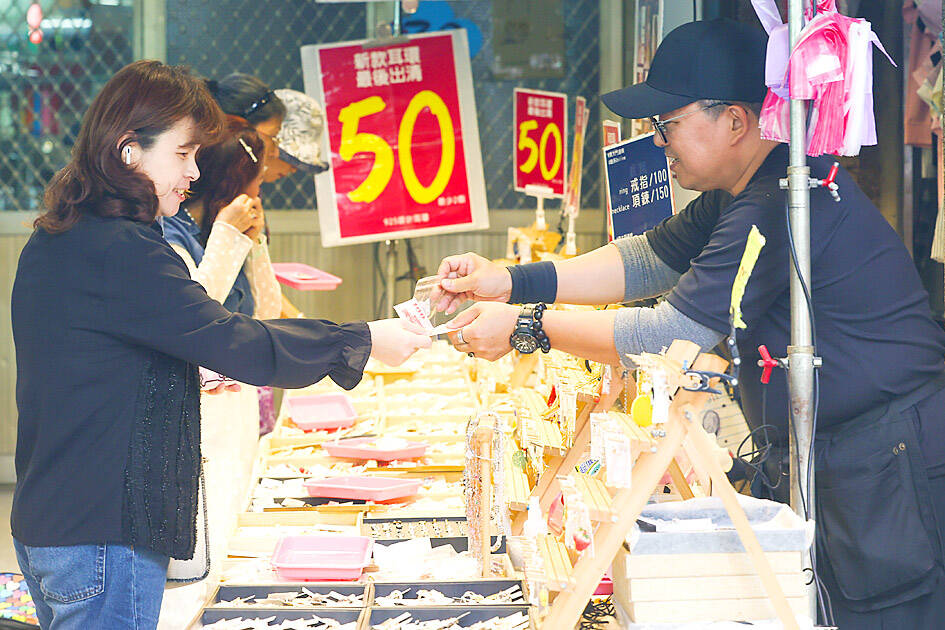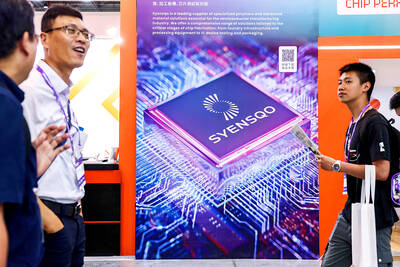The consumer confidence index this month fell for a ninth consecutive month to its lowest level in 13 months, as global trade uncertainties and tariff risks cloud Taiwan’s economic outlook, a survey released yesterday by National Central University found.
The biggest decline came from the timing for stock investments, which plunged 11.82 points to 26.82, underscoring bleak investor confidence, it said.
“Although the TAIEX reclaimed the 21,000-point mark after the US and China agreed to bury the hatchet for 90 days, investors remain worried that the situation would turn sour later,” said Dachrahn Wu (吳大任), director of the university’s Research Center for Taiwan Economic Development, which conducted the survey.

Photo: CNA
US threats to impose tariffs on semiconductors remain the main concern, as Taiwan is home to the world’s largest supplier of advanced chips used in artificial intelligence (AI), smartphones, high-performance computing and other technologies.
Exports fared well in the first half of this year, due partly to front-loading demand, but could turn south if trade negotiations prove disappointing, Wu said.
The US on April 2 slapped a 32 percent tariff on Taiwanese goods before announcing a 90-day pause on April 9 for trade negotiations.
A 20 percent tariff could be seen as relatively favorable, but even that figure represents a steep rise from the current 10 percent levy, Wu said.
Taiwan’s economic health would come under pressure in the second half when US tariffs go into practice and play havoc with global trade, he said.
That explained why the index’s six subindices all shed points in the poll of 3,099 adults, he said.
Meanwhile, the government’s business climate monitor last month was “yellow-red,” following a loss of three points to a six-month low, indicating Taiwan’s economy shows resilience, but challenges remain, the National Development Council said.
Taiwan’s strong exports were due to stockpiling by global firms ahead of US tariffs and real demand by US technology giants to grow their AI capabilities, council Economic Department Director Chiu Chiu-ying (邱秋瑩) said.
It is too early to predict the impact of the tariffs, as US President Donald Trump has been inconsistent on the matter, Chiu said.
The index of leading indicators, which seeks to capture the economic situation in the next six months, shrank 0.81 percent to 100.37, falling for three consecutive months, as business confidence, local share prices and export orders displayed retreats, the council said.
The index of coincident indicators, which reflects the current economic state, augmented 1.59 percent to 107.97, helped by positive imports of electrical and machinery equipment, exports, industrial output and overtime hours, it said.

SEMICONDUCTOR SERVICES: A company executive said that Taiwanese firms must think about how to participate in global supply chains and lift their competitiveness Taiwan Semiconductor Manufacturing Co (TSMC, 台積電) yesterday said it expects to launch its first multifunctional service center in Pingtung County in the middle of 2027, in a bid to foster a resilient high-tech facility construction ecosystem. TSMC broached the idea of creating a center two or three years ago when it started building new manufacturing capacity in the US and Japan, the company said. The center, dubbed an “ecosystem park,” would assist local manufacturing facility construction partners to upgrade their capabilities and secure more deals from other global chipmakers such as Intel Corp, Micron Technology Inc and Infineon Technologies AG, TSMC said. It

EXPORT GROWTH: The AI boom has shortened chip cycles to just one year, putting pressure on chipmakers to accelerate development and expand packaging capacity Developing a localized supply chain for advanced packaging equipment is critical for keeping pace with customers’ increasingly shrinking time-to-market cycles for new artificial intelligence (AI) chips, Taiwan Semiconductor Manufacturing Co (TSMC, 台積電) said yesterday. Spurred on by the AI revolution, customers are accelerating product upgrades to nearly every year, compared with the two to three-year development cadence in the past, TSMC vice president of advanced packaging technology and service Jun He (何軍) said at a 3D IC Global Summit organized by SEMI in Taipei. These shortened cycles put heavy pressure on chipmakers, as the entire process — from chip design to mass

Germany is to establish its first-ever national pavilion at Semicon Taiwan, which starts tomorrow in Taipei, as the country looks to raise its profile and deepen semiconductor ties with Taiwan as global chip demand accelerates. Martin Mayer, a semiconductor investment expert at Germany Trade & Invest (GTAI), Germany’s international economic promotion agency, said before leaving for Taiwan that the nation is a crucial partner in developing Germany’s semiconductor ecosystem. Germany’s debut at the international semiconductor exhibition in Taipei aims to “show presence” and signal its commitment to semiconductors, while building trust with Taiwanese companies, government and industry associations, he said. “The best outcome

People walk past advertising for a Syensqo chip at the Semicon Taiwan exhibition in Taipei yesterday.